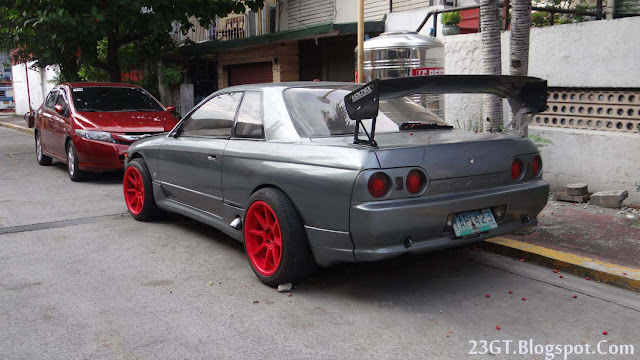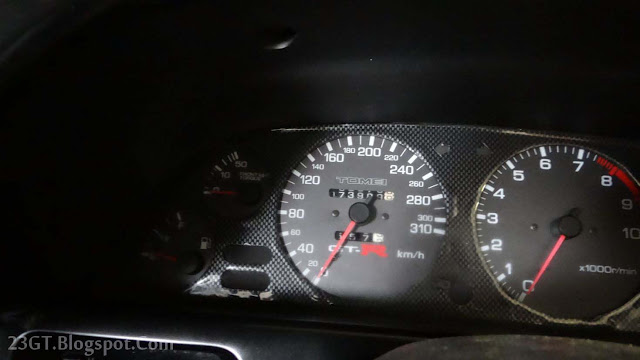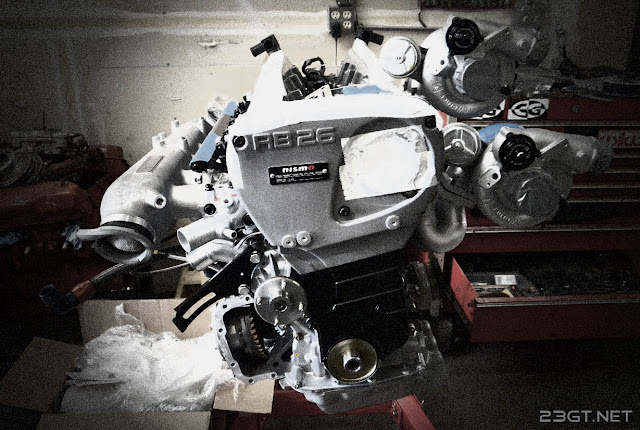After coming back from a long vacation
in my old homeland of the Philippines a few months back I promised
I'd write a post about car culture over there. It's a bit overdue
thanks to the ongoing saga of my R32 as well as other stuff but
finally here it is.
Most Filipinos are
interested in cars to a certain degree and car culture over there
actually bears a lot of similarities to here in the US because of the
American influence from the years when the US controlled the country.
People like certain brands, there are car clubs and car shows, and
driving is seen as a vital and liberating privilege.
One of the main
differences of course versus the US is an overwhelming emphasis on
Japanese imports instead of American cars because Japan is much
nearer geographically, plus the US car companies all pulled out of the country back
in the '80s because of the political climate.
 |
| The Philippines is a melting pot of cultures, including car culture. |
 |
| You'll see everything from this crazy R32 drift car with sidepipe... |
|
|
|
|
 |
| ...(it's even left-hand drive converted!)... |
 |
| ...to the silly... |
 |
| ...to the indigenous... |
 |
| ...to the simple... |
 |
| ...to the OMGWTFBBQ!?! |
The dominance of
the Japanese is being heavily challenged now though because the
American Big Three have all come back since the late '90s and Fords
and Chevys are now a common sight with Chrysler products more rare
but still not unheard of. You also get some brands that we don't get
here in the US like French carmaker Peugeot who's recently begun
trying to make inroads in the local market. And then there are the
Chinese brands like Geely, Chery, and Foton – though the impression
of their products in the Philippines is generally the same as what Hyundai and Kia
used to have here in the US: better than catching Ebola but not by
much. Isuzu and Suzuki may be dead and buried here in the States but
they're very much alive and well in the Philippines where frugal
transportation is more prized than here in the land of the Big Mac.
And would you believe there's a Morgan dealership in the Philippines?
Yeah, that stodgy British brand that still makes its cars out of dead
trees has a sales office there; though I've never once seen a Morgan
on Philippine roads so maybe it's just a front for a macaroon
smuggling racket or something.
 |
| One of the local Peugeot dealerships - complete with handy dandy pronunciation guide |
 |
| Your eyes don't fool you. That's a Morgan dealership with a Chinese-built MG in front - with the Union Jack on the roof. |
You also have
swanky dealerships for exotic and luxury brands like Ferrari,
Lamborghini, Porsche, Audi, BMW, and so on. Too bad the average
Filipino can barely afford a decent car in the first place. And
that's probably the one thing that most influences Philippine car
culture – economics.
 |
| Pardon me, is this the Baller Building? |
The Philippine
economy may be healthy enough to rank 39th in the world,
ahead of seemingly more well-off countries like Finland, Portugal,
and Qatar, but the problem is that that money has to be split among a
lot more people than in those places. So while there are some
ultra-rich families and a decent middle class, the average Filipino
earns much less than his equivalent counterpart here in the US –
think one-sixth the income. The situation has improved over the years
but it still has a long way to go before matching more developed
countries.
Despite salaries
that are a fraction of American wages, prices for complex
manufactured goods like cars are pretty similar to US rates. Because
of that the perception of cars is very different compared to here.
First of all, the
car is still very much a status symbol. While here in the US we
pretty much take having a car for granted nowadays and expensive cars
are pretty common, in the Philippines having any sort of non-decrepit
car shows you or your family are at least somewhat well off. For many
Filipino males just having a car exponentially increases your “pogi points”
- basically a guy's appeal to the fairer sex (which is usually assessed by the guys themselves so it's essentially bullshit). Materialistic as it may sound, the opposite sex pays a lot more attention to the car you drive than over here simply because it's an indicator you have a decent income in a country where lots of people still struggle for basic needs. Yup, in
the Philippines cars do increase your ability to mate.
 |
| A unique sporty car like this 240SX is a total sex machine in the Philippines |
To paint the
picture a bit clearer about how the perception of cars over there is
different in terms of someone's personal wealth – a Toyota Camry
is considered a luxury car there. Yes, a f*cking Camry is a luxury
car – because when a new Mazda2 or a well-kept 5-year old 1.8 liter
Civic is a BIG DEAL for the typical family even something as average as a new Camry can seem
pretty bad-ass. Granted we're talking about a V6-powered,
leather-swathed, fully-loaded Camry but it's still the same king of
the beigemobiles we see over here. If you happen to drive something
even fancier like a sports car or a big Mercedes, don't be surprised
if people wonder if you're a celebrity, business tycoon, or drug
dealer – or all three.
That's assuming you
even drive your own vehicle. Because wages are so low most families
with any means opt to hire a driver to schlep them around. Although I
still drive from time to time when I'm back there even I leave most
of it to the family driver because of the traffic in the big cities.
City driving in the Philippines is just like driving in L.A. or New
York, if those cities were inhabited exclusively by lawless maniacs
auditioning for another Mad Max sequel. It's definitely not for the
faint of heart.
 |
| It may seem like blasphemy for a gearhead to want to be driven around but I think you'd understand when traffic gets this bad. |
 |
| And having a driver lets you enjoy the scenery...err... |
 |
| ...yes, the scenery...this is what I meant! |
 |
| Yep, scenery. The Philippines is very pretty away from the madhouse of the cities. |
A lot of younger
males and females view driving as a point of pride though. It's often
seen as a rite of passage and because having a car is a big deal
people love to individualize their vehicles. It's rare to see two
cars that are exactly alike – even common models – because
usually they'll have aftermarket wheels, stickers, enough chrome
accessories to empty all the Pep Boys in the USA, or whatever other
gewgaw their owner's taste (or lack of it) finds appealing. Usually
the customization is just aesthetic – true performance mods are
relatively uncommon and are usually limited to simple stuff like
exhausts and intakes because of the costs involved.
Rice is a staple
food in the Philippines and unfortunately it's a staple in the car
culture too. Because Filipinos love to have a unique and flashy car
even the car manufacturers offer models that are pre-riced. Witness
this Mugen CR-Z that is the same as a regular CR-Z except it has a
body kit imbued with 100% extra Fast-and-the-Furious-ness.
 |
| Dunno why but "lipstick on a pig" keeps coming to mind... |
And if stickers
gave you more horsepower, Filipinos would have all the drag-racing
records in the world now. "Decalcomanic" isn't a real word but it sure describes the sticker-obsessed Filipino.
 |
| Even the exhaust tip has stickers - what is this I don't even... |
Although most cars
suffer from a bad case of rice, thankfully there are also a lot of
more tastefully modded cars like this Honda Jazz (Fit here in the US) and Mitsubishi Lancer.
 |
| A little over the top by some standards but still better put together than most. |
 |
| Just an average Lancer but relatively nicely modded. |
Just like the US
nowadays you'll see a lot of SUVs and pickups wandering the streets
but unlike here where people usually buy them strictly for their image, in the
Philippines there's also a heaping helping of practicality to the
choice. Roads can get pretty bad from lack of maintenance so the
meatier tires are useful while the higher ground clearance helps a
lot when the typhoons come and make Katrina-ravaged New Orleans look
like a neighborhood pool party. Over here your neighbor has a Hummer
probably only because he wants to feel better about his small weenus - in the Philippines, it's because he has a small weenus AND
because it's safer for taking the kids to school in the rainy season
than a Zodiac RIB.
 |
| THAT is a knock-off Humvee - it may even have been made by the same "artisans" that made the jeepney going the other way lol. |
 |
| Most people though prefer to buy SUVs that are not cheap replicas of clunky military hardware, like our family's Mitsubishi Montero Sport. |
 |
| Even trucks can't escape the rice. Overdoing it like this is pretty common sadly. |
What you won't see
a lot of in the Philippines are well-preserved old cars. Most people
don't want the hassle of maintaining an older car or the perception
that comes with it that you can't afford a nice new one. There's a
growing subculture though of people interested in older cars so
occasionally you do see them, like this nicely-maintained '80's
Lancer that I found.
 |
| Found this very well-kept Lancer in Banawe - the car accessory capital of Manila... |
 |
| ...along with this amusing Piaggio Ape. |
Despite all these
differences one thing the Filipino gearhead shares with his brethren
in other countries is passion. Even with a lot more limited budget
Filipinos are just as proud of their babies as anyone else. While I
was back there in July I met the publisher of Power Wheels, one of
the local car mags, and for three straight hours we talked about cars
(with about 30 minutes of girls, firearms, and motorcycles mixed in)
just like any other pair of car enthusiasts would. During that time
he showed me one of his babies, an electric blue 1977 Mitsubishi
Celeste – known as the Plymouth Fire Arrow over here in the US. He had
just gotten it recently and the previous owner had put on some
questionable mods but it was a beloved car from his childhood, as it
was for me. My dad, who I inherited my gearhead genes from once owned
an apple green version of this same car and all of my family still
have a soft spot for the Celeste. We've even toyed with the idea of
tracking my dad's old one down again.
 |
| A neglected classic in the process of restoration...like my Skyline :) |







































Thank you for your share about the different country's auto culture. It is interesting.
ReplyDelete